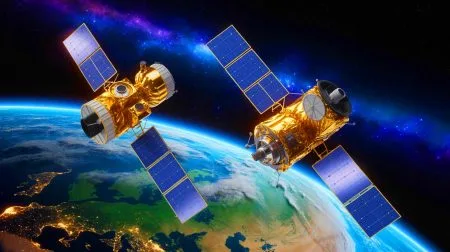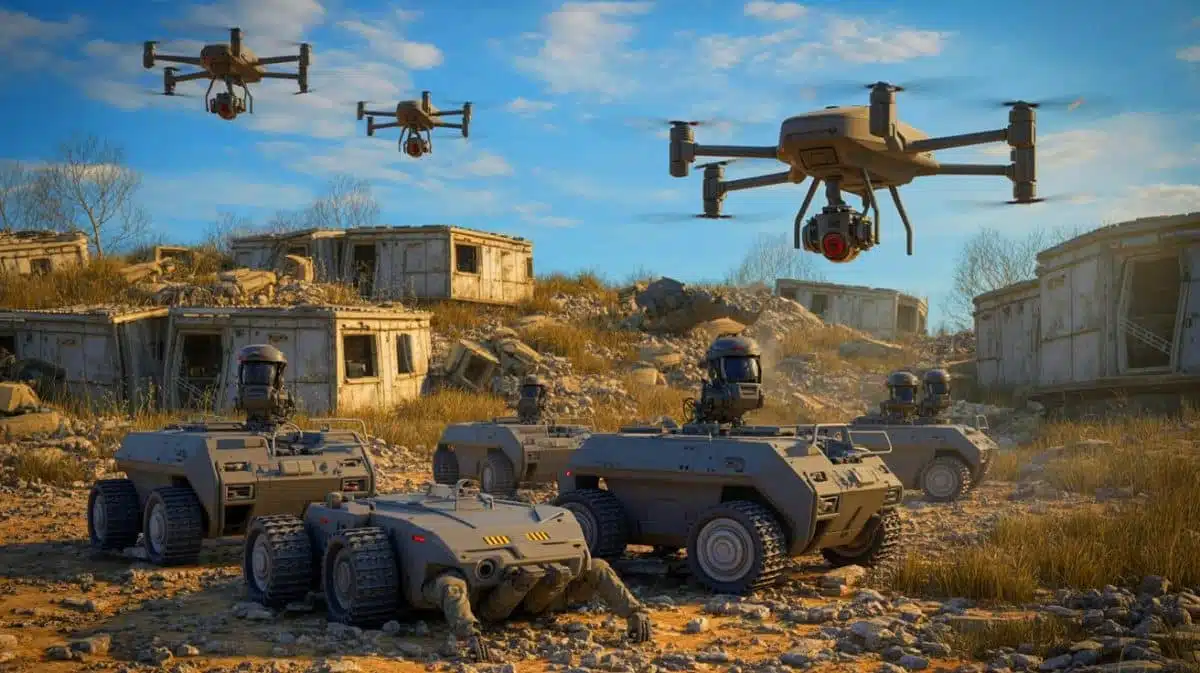| IN A NUTSHELL |
|
In a groundbreaking event that has reshaped the landscape of modern warfare, Ukraine’s military forces have successfully executed the world’s first unmanned offensive operation using ground robots and aerial drones. This innovative approach, led by Ukraine’s elite 3rd Separate Assault Brigade, demonstrates the increasing role of autonomous technology in military strategies. The operation took place in the Kharkiv region and involved the capture of Russian troops without a single Ukrainian soldier on the ground, a significant milestone in the evolution of combat tactics.
Robots Just Captured Russian Soldiers
The remarkable feat was orchestrated by Ukraine’s 3rd Separate Assault Brigade, specifically its cutting-edge “DEUS EX MACHINA” drone company. This operation utilized an advanced combination of FPV (first-person view) kamikaze drones and ground robotic complexes (GRCs) to infiltrate and neutralize fortified Russian positions that had previously resisted human-led efforts. The assault was initiated by a kamikaze ground robot that targeted a Russian bunker, leading to its destruction and the subsequent surrender of the remaining soldiers to avoid further annihilation. As the brigade reported on Telegram, the captured soldiers were then remotely guided back to Ukrainian lines using drones, referred to as “birds,” which coordinated the mission through live-feed visuals.
This operation marks the first confirmed success of an entirely unmanned assault in modern warfare, showcasing a strategic breakthrough. The brigade emphasized that positions which had previously resisted human attacks were reclaimed by their robots through meticulous planning and execution. Notably, no Ukrainian troops were present during the assault, underscoring the shift towards unmanned systems in active combat zones. Although the exact number of captured personnel and the location of the engagement remain undisclosed, the mission’s symbolic significance surpasses its tactical impact.
Modern Warfare Using Drones
While unmanned systems have been part of military operations for some time, their use as primary assault units marks a new chapter in warfare. Typically relegated to support roles such as reconnaissance and logistics, these systems are now taking center stage in offensive operations. Ukraine’s strategic use of these technologies during its ongoing conflict with Russia highlights a shift towards asymmetric warfare, leveraging low-cost drones and AI-guided munitions to offset disadvantages in conventional manpower and weaponry. This innovative approach has proven effective not only in reconnaissance but now also in direct combat roles.
The DEUS EX MACHINA unit’s success signals a potential doctrinal change in modern conflict, particularly in attritional environments like eastern Ukraine, where human casualties are high, and traditional breakthroughs are scarce. Ukraine’s operationalization of unmanned systems under real-world combat conditions contrasts with Western militaries, which have mostly explored these technologies in theoretical settings. The successful unmanned assault could redefine the role of robotics in warfare, offering new strategies for reducing human risk, accelerating assault tempos, and maximizing the potential of low-cost robotic technologies in high-stakes scenarios.
The Future of Unmanned Combat Operations
As the landscape of warfare continues to evolve, Ukraine’s use of unmanned systems may set a precedent for future military strategies worldwide. The potential benefits of such operations include reduced risks for human soldiers, faster and more efficient assault tactics, and a shift towards more sustainable, cost-effective warfare. The success of the DEUS EX MACHINA unit showcases how these technologies can be effectively integrated into modern combat, offering a glimpse into the future of military operations.
Should other nations adopt similar strategies, the nature of warfare could change significantly, with unmanned systems playing a central role in combat operations. This shift could lead to a reevaluation of military tactics and the development of new doctrines that prioritize technological superiority over traditional manpower. As countries continue to invest in and develop autonomous technologies, the potential for unmanned systems to revolutionize warfare becomes increasingly apparent.
Implications for Global Military Strategy
The successful execution of Ukraine’s unmanned assault has far-reaching implications for global military strategies. As nations observe the effectiveness of these technologies in real-world combat, there may be increased interest in developing and deploying unmanned systems for a variety of military applications. This shift could lead to a new era of warfare characterized by technological innovation and a focus on minimizing human casualties. The strategic use of drones and robotic systems offers a glimpse into a future where wars are fought with precision and efficiency, leveraging advanced technologies to achieve military objectives.
As the world watches Ukraine’s pioneering efforts, the question remains: How will other nations adapt to this new paradigm, and what role will unmanned systems play in the future of global military conflicts?
Did you like it? 4.6/5 (25)








Wow! 🤖 Who knew robots could be so effective in warfare? This is straight out of a sci-fi movie!
Impressive, but what about the ethical implications of using AI in warfare?
No way this happened without a single human! Seems a bit far-fetched.
Can’t wait for the movie adaptation of this mission! 🎬
How reliable are these robotic systems in complex combat scenarios?
Next step: robot peacekeepers? 🤔
This is a game-changer! Ukraine’s innovation is commendable.
Are these robots made in Ukraine or imported from another country?